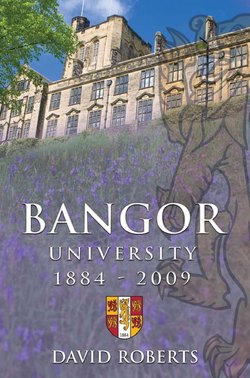Читать книгу Bangor University 1884-2009 - David Roberts - Страница 9
На сайте Литреса книга снята с продажи.
ОглавлениеForeword
Prifysgol Bangor University has been at the intellectual centre of my life. At 17, in a spirit of inverted snobbery which has been a trait since, I refused to take my old grammar school headmaster’s advice to apply to Jesus College, Oxford. Instead I worked to win a William James Lewis Scholarship to the University College of North Wales – as it was called then – in Bangor. In a move typical of the ‘family University’ which we still are even at 11,000 students, I was following in my father’s footsteps.
He had been a star of Professor Ifor Williams’s pioneering Welsh-language translations of Ibsen’s modern dramas in the 1920s, as well as a tough and quick rugby half-back, a devotee of inter-varsity smokers, and a member of the Student Representative Council, before deserting the boards for the pulpit and becoming a divinity student with the Presbyterians. In much, but not all of that, I followed him.
It was in the Students’ Union, on the stage of P-J (Neuadd Prichard-Jones) at would-be-revolutionary general meetings around 1968, or in the smoked-filled rooms of old Tanrallt, at inter-University debates, or heckling visiting politicians, that I learnt my politics. It was in Neuadd Reichel as a three-year pampered scholarship student that I learnt to be sociable, to drink sherry in the common room and robust wines with formal meals of fine Welsh meat. Ours was the first generation of male students to be allowed to entertain women in our own rooms within regulations on a sultry Sunday afternoon, between serious games of croquet on manicured Reichel lawns.
Moving from graduate to postgraduate in the hugely erudite School of Welsh, I was later to teach drama bilingually in the School of English, and to complete a Ph.D. in literary history and theory just before the regulations caught up with me. By then we were called University of Wales, Bangor, a form of naming which did nothing for us, I thought. A joyful moment tinged with sadness was when I succeeded my father’s close friend and my boyhood hero Lord Cledwyn, wearing those amazing robes at graduation ceremonies in that same Neuadd P-J, where I had graduated, as President.
There are regrets too, not only the personal ones of loss of friends and colleagues over the years, but those of institutional failures. A particular period of estrangement for me was when Bangor became an arena of struggle for bilingual language rights to which the then authorities failed to respond in a positive way. I regret that I did not really try to improve my relationship with Principal Sir Charles Evans until it was too late. But that Wales now feels like another country!
My pleasure to have been a graduate, a postgraduate, a member of staff and finally President of my own University is second only to my unrelenting pride in our new-found independent University status and degree-awarding powers. Bangor is at once both the most Welsh in language and attitude of our universities, and the most international in aspiration and intellectual quality, serving its immediate community by raising its horizons of expectation. I hope that you will take pleasure in this splendid account of the institution’s growth and development. We rejoice exuberantly in our 125-year family history as the old College of the North which, as Bangor University, still proudly flies the colours of the Prince Llywelyn!
The Rt. Hon. Lord Elis-Thomas, AM
President, Bangor University
